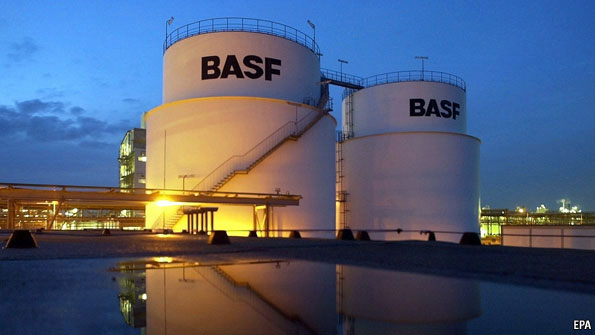BASF seeks a stable formula 

Jun 23rd 2010, 13:55 by The Economist online | BERLIN
WILD gyrations in the level of orders are enough to kill most businesses. In the chemical industry, they are routine. When economic crisis hit in 2008, demand for the basic chemicals used in everything from paints to plastic bags plummeted. Sales in some divisions of BASF, the world’s biggest chemical company, fell by almost half in 2009 as both volumes and prices slumped. Even the good times for commodity chemicals tend not to last long, as improving prices trigger capacity-building, which soon leads to a glut.
BASF has weathered these swings better than most. Its size helps: it always has some big plants somewhere that could benefit from a few months of quiet so that maintenance workers can open them up for a good scrubbing. Diversity helps too, since the prices of some chemicals may hold up better than others. And it has become well practised in the art of ruthlessly driving down its costs.
But for all these advantages, BASF also faces some real constraints. One is that as fast as it is growing in developing countries, it still has a huge presence in developed ones where employees are expensive and ageing. More important, perhaps, is that its shareholders expect it to produce good returns on its investment, whereas some competitors, especially state-backed ones, make investment decisions based more on politics than economics: the result is overcapacity, which brings down the returns for all producers.
Chemical
dependency
Given all this, BASF has for some time been
pressing hard to reduce its dependence on commodity chemicals. Instead
it wants to move into more specialised products with higher margins and
steadier demand. It is not the first chemical company to head down this
path. Britain’s ICI, once a sprawling, integrated chemical giant like
BASF, spun off so many of its divisions that it ended up vanishing
altogether as an independent company. Some of BASF’s competitors
have pushed into pharmaceuticals and health care.
Few, however, have done so quite as well as BASF, which has proved adept at swallowing up smaller competitors and then cutting their operating costs. Last year it bought Ciba and, despite grumbles that it had overpaid, it seems to be getting its money’s worth, through having broadened its presence in attractive product areas such as the chemicals used for making paints and cleaning water. Synergy is a dangerously overused word in business, but sometimes it fits.
Now BASF hopes to repeat the trick with its purchase, confirmed on June 23rd, of Cognis, a smaller firm whose products are used, among other things, in cosmetics and household cleaning products. These enjoy higher margins than typical commodity chemicals and enjoy fairly stable demand. Even in the depths of last year’s downturn Cognis was generating cash and paying down debt.
Vitamins
are good for you
The value of the deal was €3.1 billion
($3.8 billion), of which only $700 million was the purchase price with
the rest made up of debt that BASF will assume. As with the Ciba
takeover, there are some complaints that it is overpaying. Moody’s said
the takeover might affect BASF’s credit rating, although it acknowledged
that the chemical giant was highly liquid and had strong cashflow. Over
the longer run it seems an attractive deal because it makes BASF the
world’s biggest supplier of cosmetic ingredients and the third-largest
supplier of food additives such as vitamin E. Both of these markets are
growing fast and have big barriers to entry.
In the boom that preceded the financial crisis, chemical conglomerates like BASF risked falling prey to swift-footed private-equity firms armed with limitless cheap finance, who would dismember them and then sell or float the component businesses. But Cognis’s private-equity owners have been trying to divest themselves of it since 2005, with their plans repeatedly undermined by stockmarket downturns. Now, with credit harder to find, the big conglomerates with their diverse sources of cash are finding that they have become the predators.



 留言列表
留言列表
 【蔡英文說想想】:【中華民國國家作戰系統安全藍圖】
【蔡英文說想想】:【中華民國國家作戰系統安全藍圖】 
